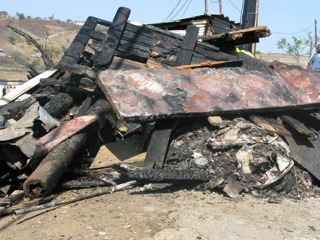 Eight people were buried this weekend after another disastrous fire in the Kennedy Road shack settlement in Durban, South Africa.
Eight people were buried this weekend after another disastrous fire in the Kennedy Road shack settlement in Durban, South Africa.The municipality blames the squatters, who get drunk and knock over the candles. The squatters knock down that ugly slander. It is, rather, the municipality that is to blame, for its policy of refusing to allow electrification in the shack neighborhoods. And when the squatters pirate electrical service, the municipality dispatches the police to destroy the makeshift connections and arrest (and sometimes bludgeon) the offenders.
Here's a stark statement of the problem, from Abahlali baseMjondolo, the brave squatter mobilzation in eThekwini Municipality:
Let us be clear. People in houses [as opposed to wood and sheet metal shanties] also get drunk. Their children also like to play in the house. The difference is that they have electricity and so their houses do not burn when these things happen....The problem is not that we are stupid. We do not need training on how to avoid fires. The problem is that we do not have electricity. Electricity will save our lives. Most fires are caused by candles and paraffin stoves. If they don’t connect we must connect. If they will not connect us then they must not arrest and beat us for connecting ourselves. If democracy is for everybody then everybody needs to be safe in a democracy and we are doing the work of the government when we connect ourselves. When we connect ourselves we are making the democracy real. When we connect ourselves we are making everyone count the same. Anyone who says that electricity is a luxury that the poor do not deserve must spend one winter living in a shack and trying to survive the fires before they speak about what is a luxury and what is a necessity.



